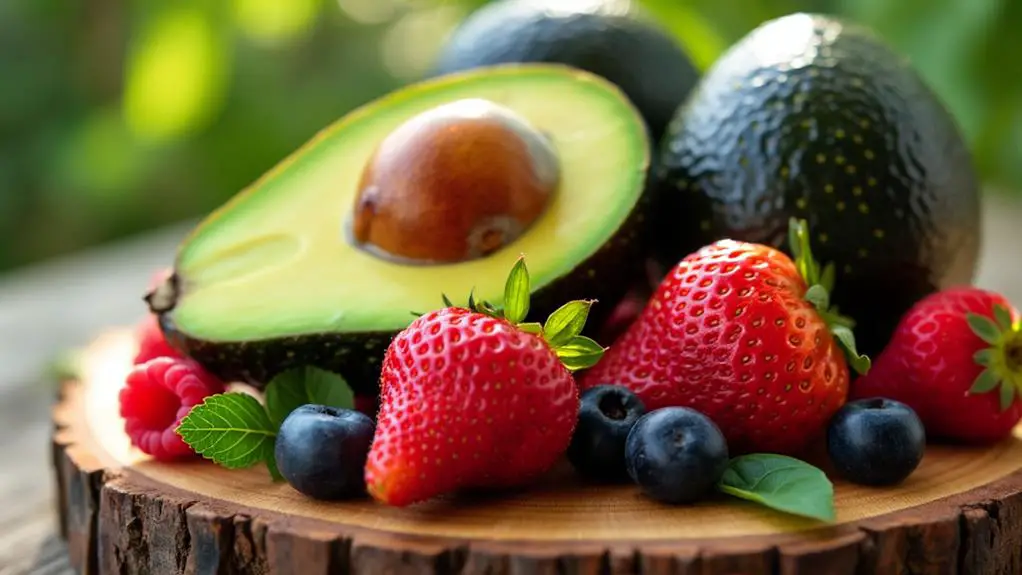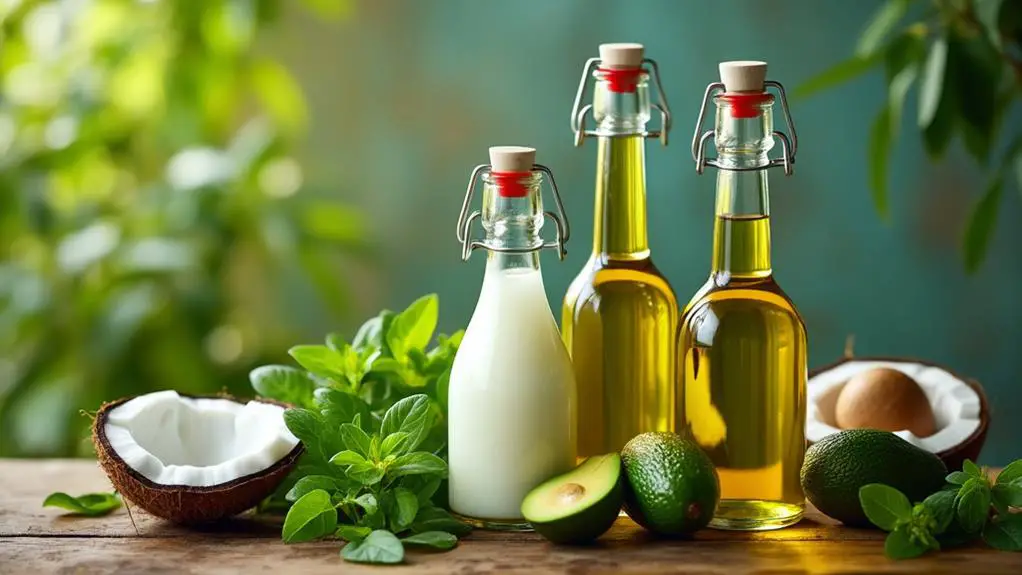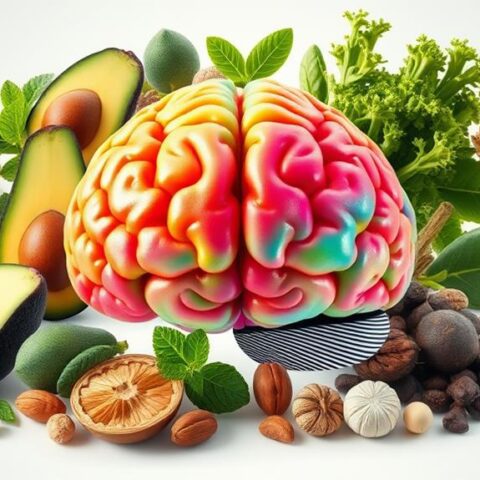
For ideal ketosis, prioritize nutrient-dense foods. Fatty fish, like salmon, provide high omega-3s beneficial for insulin sensitivity. Meat and poultry offer essential proteins and fats, with grass-fed options yielding higher omega-3s. Eggs, low in carbs, deliver vitamins B12 and choline. Cheese and plain Greek yogurt offer proteins and low carbs, enhancing satiety. Unsweetened almond milk is a low-carb dairy alternative. Non-starchy vegetables, such as spinach, are nutrient-rich, while avocados offer healthy fats. Almonds and chia seeds provide beneficial fibers and fats. Oils like olive and coconut support heart health. More information awaits for deeper understanding.
Key Takeaways
- Fatty fish like salmon and mackerel are low in carbs and high in omega-3s.
- Eggs provide high-quality protein and essential nutrients with less than 1 gram of carbs.
- Non-starchy vegetables such as spinach and kale are nutrient-dense and low in carbs.
- Nuts and seeds like almonds and chia seeds are low in carbs and rich in healthy fats.
- Healthy oils like olive and avocado oil offer beneficial fatty acids for heart health.
Seafood Options
When considering seafood options for a keto diet, it is essential to focus on types that align with the diet's low-carb requirements while providing substantial nutritional benefits.
Keto seafood, such as fatty fish like salmon and mackerel, is particularly advantageous due to its high omega-3 content. These healthy fats not only improve insulin sensitivity but also support cardiovascular health, making them a cornerstone of a keto-friendly diet. The American Heart Association's recommendation of 8-10 ounces of seafood weekly underscores the importance of including these nutrient-dense foods in your meal plan.
Additionally, regular consumption of such seafood is linked to improved lipid profiles, such as increased HDL cholesterol and decreased triglycerides, which are beneficial for managing type 2 diabetes.
Fish and shellfish generally contain no carbohydrates, which positions them as an excellent protein source for keto enthusiasts. Shrimp and most crab varieties are virtually carb-free, enhancing their appeal.
However, it's vital to note the variable carb content in options like oysters and octopus, which remain relatively low yet necessitate mindful portion control. Regular consumption of these keto seafood options is linked to enhanced brain health and a reduced risk of chronic diseases.
As a result, integrating a variety of seafood can not only meet keto diet requirements but also contribute to overall health and well-being.
Meat and Poultry
Exploring the domain of meat and poultry is essential for anyone committed to the ketogenic diet, as these foods are foundational in meeting the diet's macronutrient requirements. Fresh meat and poultry are excellent protein sources, offering high-quality protein needed to preserve muscle mass without contributing carbohydrates.
For those following a keto lifestyle, selecting grass-fed meat can be particularly advantageous. Grass-fed benefits include higher levels of omega-3 fatty acids and conjugated linoleic acid (CLA), which support cardiovascular health and may enhance metabolic functions.
Furthermore, fresh meat and poultry, such as chicken breast and ground turkey, provide a versatile base for a variety of dishes, from grilled steaks to flavorful stir-fries.
Chicken breast, with its 0 grams of carbs, 3 grams of fat, and 31 grams of protein per 3.5 ounces, serves as a prime lean protein source. However, embracing fatty cuts like ribeye or pork belly can also be strategically beneficial. These cuts align with the keto diet's higher fat requirements, ensuring adequate caloric intake from fats rather than carbohydrates.
Additionally, regular inclusion of meat and poultry in the diet has been shown to increase HDL cholesterol levels, which is particularly beneficial for older women on a high-fat diet. Consequently, these protein sources are indispensable for maintaining both dietary adherence and overall health within a ketogenic framework.
Eggs Benefits
Eggs, a staple in the ketogenic diet, offer an impressive nutritional profile that aligns perfectly with the diet's low-carbohydrate, high-fat framework. With less than 1 gram of carbs per large egg, they are an ideal choice for anyone pursuing ketosis.
Eggs are a powerhouse of egg nutrition, providing approximately 6 grams of high-quality protein and essential nutrients, including vitamin B12, selenium, and choline. These nutrients support various bodily functions, enhancing overall health while adhering to keto principles.
In addition to their macronutrient benefits, eggs are also known for their role in improving cardiovascular health due to the ability of the keto diet to lower LDL and boost HDL cholesterol. The benefits of consuming eggs extend beyond their macronutrient composition.
Whole eggs are rich in antioxidants such as lutein and zeaxanthin, which are vital for eye health and can help protect against age-related macular degeneration. Furthermore, the consumption of eggs can trigger hormones that promote satiety, aiding in appetite control on a ketogenic diet.
Despite common cholesterol myths, the high cholesterol content in egg yolks does not correlate with an increased risk of heart disease for most individuals.
Here are some key points:
- Eggs contain less than 1 gram of carbs, ideal for ketosis.
- High-quality protein content supports muscle maintenance.
- Antioxidants in eggs benefit eye health.
- Cholesterol in eggs is not linked to heart disease risk.
Dairy Products
A diverse array of dairy products plays a significant role in the ketogenic diet, offering both nutritional benefits and culinary versatility.
Cheese varieties, such as cheddar, are particularly advantageous due to their low carbohydrate content (approximately 1 gram per ounce) and high fat concentration, which aligns well with keto guidelines. These cheeses not only provide essential nutrients like calcium and protein but also enhance meal flavor and satiety.
Additionally, hard cheeses like Parmesan and Swiss are excellent options for those following a keto diet due to their low carb content and rich texture.
Yogurt benefits on a keto diet are most prominent with plain Greek yogurt and cottage cheese, which, despite being moderate in carbs, are rich in protein. This protein content can promote fullness, potentially aiding in appetite control.
However, careful portioning is advised to prevent surpassing daily carbohydrate limits.
Heavy cream is another keto-friendly dairy product, prized for its low carbohydrate and high-fat composition, making it ideal for enriching recipes.
Half-and-half, containing both cream and whole milk, should be consumed sparingly due to its higher carb content.
Full-fat dairy products, including cheese and cream, may contribute to muscle mass preservation and overall health, particularly in older adults.
Nonetheless, moderation is essential to maintain a balanced ketogenic diet and avoid unintended carbohydrate intake.
Plant-Based Milk
Incorporating plant-based milk into a keto diet requires careful selection, with unsweetened almond, soy, and coconut milk emerging as ideal choices due to their low carbohydrate content.
Selecting the right plant-based milk is similar to choosing keto-friendly sweeteners like stevia or erythritol, where the focus is on low carbs and minimal impact on blood sugar.
The high sugar levels in sweetened versions can disrupt ketosis, highlighting the necessity of label scrutiny to maintain adherence to carbohydrate limits.
However, oat milk, even when unsweetened, remains unsuitable for keto due to its excessive carbohydrate levels, underscoring the importance of informed choices in maintaining dietary compliance.
Keto-Friendly Milk Options
When considering plant-based milk options on a keto diet, how can one ascertain they are making a suitable choice? The key lies in selecting nut milk and other dairy alternatives that contain minimal carbohydrates.
Here's a detailed analysis of the available options:
- Unsweetened Almond Milk: This nut milk is an excellent keto-friendly choice, boasting only 1 gram of carbs per cup. Its low-calorie profile makes it a perfect dairy alternative for those seeking to maintain ketosis.
- Unsweetened Coconut Milk: With approximately 2 grams of carbs per cup and a high content of healthy fats, unsweetened coconut milk is versatile for both smoothies and cooking. Its creamy texture can enhance various keto recipes.
- Unsweetened Soy Milk: While slightly higher in carbs at 3-4 grams per cup, unsweetened soy milk can still be a viable option. It's important to select unsweetened versions to avoid added sugars that can disrupt ketosis.
- Avoid Oat Milk: Even in its unsweetened form, oat milk contains around 16 grams of carbs per cup, making it unsuitable for a keto diet. Its high carbohydrate content can quickly exceed daily carb limits.
Always scrutinize labels for added sugars and carb content to confirm compliance with keto dietary restrictions.
Benefits and Considerations
Choosing the right plant-based milk can greatly improve the dietary experience on a keto diet. Unsweetened almond, soy, and coconut milk stand out as keto-friendly options due to their minimal carbohydrate content and versatility in recipes. For those engaged in keto meal prepping, these milks provide essential flexibility and nutrition. Unsweetened almond milk, for instance, contains about 1 gram of carbs per cup, making it a low-calorie substitute for dairy milk. Soy milk, with approximately 4 grams of carbs per cup, also offers a valuable source of plant-based proteins.
| Plant-Based Milk | Carbs per Cup (grams) |
|---|---|
| Almond Milk | 1 |
| Soy Milk | 4 |
| Coconut Milk | 6 |
Coconut milk, especially the canned type, contributes healthy fats and about 6 grams of carbs per cup, improving culinary options for cooking and baking. However, it is important to scrutinize product labels for added sugars, as sweetened versions can greatly increase carb content and disrupt ketosis. By focusing on unsweetened varieties, individuals on a keto diet can maximize their nutritional intake while maintaining ketosis, thereby facilitating effective keto meal prepping strategies.
Keto-Friendly Vegetables
Incorporating keto-friendly vegetables into a low-carb diet offers a wealth of nutritional benefits while maintaining minimal carbohydrate intake. Non-starchy leafy greens such as spinach, kale, and broccoli are rich in essential vitamins and minerals, providing substantial health benefits without exceeding 8 grams of net carbs per cup.
Vegetables like arugula and asparagus further enhance nutrient intake with their low-carb profiles and high vitamin content.
Additionally, cruciferous vegetables like cauliflower and cabbage can serve as versatile alternatives to higher-carb staples, allowing for creative and nutritious recipe substitutions that align with keto dietary goals.
Low-Carb Leafy Greens
Low-carb leafy greens, such as spinach, kale, and Swiss chard, are a cornerstone of keto-friendly vegetables due to their minimal carbohydrate content, typically containing less than 8 grams of net carbs per cup. Their inclusion in a ketogenic diet is not only practical but also nutritionally advantageous.
These leafy greens are known for their high nutrient density, providing essential vitamins and minerals such as vitamins A, C, K, and magnesium. These nutrients support overall health, offering vitamin benefits vital for immune function and bone health.
The antioxidant properties found in leafy greens can combat oxidative stress, reducing inflammation and potentially lowering the risk of chronic diseases. Additionally, the fiber content in these vegetables promotes digestive health by aiding in regular bowel movements and maintaining a healthy gut microbiome.
This fiber also contributes to weight management by enhancing satiety and curbing unnecessary cravings. Incorporating leafy greens into your keto meal planning enhances keto flexibility, allowing for creative and nutritious meal options without greatly increasing carb intake.
Consider these practical strategies:
- Salads: Use as a base for salads.
- Smoothies: Blend into keto-friendly smoothies.
- Sautéed: Sauté with healthy fats.
- Soups: Add to low-carb soups.
Nonstarchy Vegetable Alternatives
Leafy greens, with their minimal carbohydrate content and high nutrient density, seamlessly introduce the broader category of nonstarchy vegetable alternatives suitable for a ketogenic diet. Nonstarchy vegetables like broccoli, spinach, and kale are essential additions, each containing less than 8 grams of net carbs per cup. Their low calorie and carbohydrate profiles make them ideal for maintaining ketosis while offering a wealth of vitamins, minerals, and antioxidants.
The high fiber content in these vegetables supports digestion, which is vital for overall health on a restrictive diet.
Cauliflower stands out in vegetable preparation due to its versatility. It can be transformed into rice or mashed alternatives, providing a seamless substitute for grains and starchy foods without compromising on texture or flavor.
Zucchini, another keto staple, can be spiralized into noodles, offering a low-carb pasta substitute. This not only reduces carbohydrate intake but also enhances the culinary variety within a keto regimen.
Incorporating a colorful array of nonstarchy vegetables into meals is practical advice for those on a keto diet. It guarantees a balanced nutrient intake, adds diversity to meals, and adheres to dietary guidelines, making these vegetables indispensable in keto meal planning.
Low-Carb Fruits

When steering through the keto diet, selecting the right fruits is essential due to their natural sugar content. While many fruits are high in carbohydrates, certain varieties are keto-friendly due to their low net carb count, allowing for the creation of keto friendly desserts and invigorating berry smoothie recipes.
Incorporating low-carb fruits can support the effective fat-burning mechanism of the ketogenic diet while keeping insulin levels stable. Here are four low-carb fruits ideal for a ketogenic lifestyle:
- Strawberries: With approximately 8g of carbs and 2g of fiber per 3.5 ounces, strawberries are a suitable choice for moderate consumption. Their minimal sugar content makes them an excellent ingredient for keto desserts.
- Raspberries: Similar to strawberries, raspberries provide a low-carb option while delivering antioxidants and vitamins. Their rich flavor enhances any keto smoothie or dessert.
- Blackberries: Offering around 5g of net carbs per 3.5 ounces, blackberries are not only low in carbohydrates but also a powerhouse of antioxidants, contributing to overall health.
- Avocados: Unique among fruits, avocados contain 17g of total carbs and 14g of fiber per whole fruit, yielding just 2g of net carbs. Their high healthy fat content makes them versatile in savory and sweet keto dishes.
Incorporating these fruits can help satisfy sweet cravings while maintaining daily carb limits within 20-40g.
Nuts and Seeds
Why are nuts and seeds such a staple in the ketogenic diet? Their rich content of healthy fats, fiber, and protein makes them ideal for maintaining low carbohydrate intake while providing essential nutrients.
For instance, almonds, with about 6 grams of net carbs per ounce, also provide magnesium and vitamin E, supporting overall health. These nut benefits extend to various seed varieties as well, with chia seeds standing out due to their high omega-3 fatty acids and fiber content, offering only 1 gram of net carbs per ounce.
Additionally, pumpkin seeds are low in carbs and provide 7 grams of protein per ounce, making them another excellent choice for keto-friendly snacking. Incorporating nuts and seeds into a keto diet can also improve heart health and aid in weight management, thanks to their satiating properties.
Moderation is key, ensuring that their high-fat content complements, rather than overwhelms, daily macronutrient goals. Popular keto-friendly options such as walnuts, pecans, macadamia nuts, and sunflower seeds each bring unique flavors and nutritional profiles to the table.
For instance, walnuts are known for their omega-3 content, while macadamia nuts offer a buttery texture with low carb content. By selecting a variety of nuts and seeds, individuals can enjoy diverse flavors and textures, enriching their ketogenic dietary experience.
Healthy Oils

When selecting oils for a ketogenic diet, options such as olive, avocado, and coconut oil are highly recommended due to their beneficial fatty acid profiles.
These oils not only enhance the flavor of dishes but also provide heart health benefits, with olive oil's antioxidants and avocado oil's cholesterol-improving properties being significant.
Additionally, coconut oil's composition of medium-chain triglycerides, mainly lauric acid, offers antibacterial and antifungal properties.
Furthermore, coconut oil's medium-chain triglycerides are metabolized efficiently, offering an energy boost and potential support for weight management, making these oils essential components of a healthy keto regimen.
Ideal Cooking Oils
Selecting the right cooking oil is vital for maintaining a healthy ketogenic diet, as it not only influences the flavor and texture of your meals but also greatly impacts your health.
Using oils with favorable profiles is essential for both cooking techniques and oil storage. For those following a keto diet, consider these options:
- Olive Oil: Rich in monounsaturated fats and antioxidants, olive oil is ideal for low-heat cooking and dressings. Its stability at lower temperatures makes it a versatile and healthy choice.
- Coconut Oil: With its medium-chain triglycerides (MCTs), coconut oil boosts energy and aids fat burning, making it perfect for sautéing and baking. Store in a cool, dark place to maintain its integrity.
- Avocado Oil: This oil boasts a high smoke point, perfect for high-heat cooking techniques like frying. Its monounsaturated fat content supports heart health, while proper storage guarantees its long shelf life.
- Avoid High Polyunsaturated Fat Oils: Oils high in polyunsaturated fats can lead to inflammation.
Prioritize oils like avocado and olive to maximize health benefits.
Heart Health Benefits
A growing body of evidence highlights the significant heart health benefits of incorporating healthy oils, such as olive oil, coconut oil, and avocado oil, into a ketogenic diet.
These oil varieties are rich in monounsaturated and saturated fats, instrumental in reducing LDL cholesterol and increasing HDL cholesterol, thereby promoting heart health. Extra virgin olive oil, known for its oleocanthal content, offers anti-inflammatory effects comparable to ibuprofen, potentially lowering heart disease risk.
Regular consumption of these oils is associated with improved blood lipid profiles, effectively reducing cardiovascular risk factors.
Coconut oil, notable for its medium-chain triglycerides (MCTs), aids in heart health by supporting energy expenditure and enhancing fat oxidation. This can play a vital role in weight management, further benefiting cardiovascular health.
Avocado oil, similar to olive oil, is rich in monounsaturated fats, which are essential for maintaining healthy cholesterol levels.
For individuals adhering to a keto diet, integrating these healthy oils can lead to significant improvements in blood pressure and overall heart function.
Practical advice includes using these oils as salad dressings, cooking oils, or even as a flavorful addition to keto-friendly meals to guarantee long-term cardiovascular benefits.
Keto Diet Essentials
In the context of a ketogenic diet, healthy oils are indispensable due to their rich monounsaturated and saturated fat content, which is crucial for both heart health and culinary versatility.
Incorporating oils such as olive, coconut, and avocado into keto meal planning not only enhances flavor but also guarantees the intake of essential fatty acids. These oils should be considered fundamental pantry items for anyone committed to a ketogenic lifestyle.
- Olive Oil: Known for its high antioxidant content, olive oil contains oleocanthal, which possesses anti-inflammatory properties. Ideal for dressings and drizzling, it contributes to the diet's heart-healthy benefits.
- Coconut Oil: Rich in medium-chain triglycerides (MCTs), coconut oil is noted for enhancing energy levels, improving brain function, and reducing abdominal fat. Its versatility makes it a staple in many keto recipes.
- Avocado Oil: With its high smoke point, avocado oil is perfect for high-temperature cooking. Packed with monounsaturated fats, it supports healthy cholesterol levels and overall health.
- Nutritional Impact: These oils provide essential nutrients, making them critical components of keto meal planning.
They are not only essential pantry items but also crucial for optimizing health and metabolic function on a ketogenic diet.
Low-Carb Sweeteners
While maintaining a ketogenic diet, choosing the appropriate sweeteners is essential for achieving desired health outcomes without compromising carb limits. Low-carb sweetener varieties such as stevia, erythritol, and monk fruit extract provide a viable alternative to traditional sugars, offering significant health benefits.
For instance, monk fruit extract is a popular choice among keto-friendly chocolate brands due to its low glycemic index and zero-calorie content. Stevia, a natural sweetener derived from the Stevia rebaudiana plant, is entirely calorie-free and has demonstrated potential in lowering blood sugar and cholesterol levels, making it an ideal choice for keto enthusiasts.
Another popular sweetener, erythritol, is a sugar alcohol that contains a mere 0.24 calories per gram and does not increase blood sugar or insulin levels, thereby supporting metabolic goals.
Monk fruit extract, derived from the monk fruit, is exponentially sweeter than sugar, ranging from 100 to 250 times in potency, and possesses zero calories and carbohydrates. This makes it an exceptional option for those adhering to ketogenic principles.
However, it is imperative to use these sweeteners in moderation. Excessive consumption, particularly of sugar alcohols like erythritol, may lead to digestive discomfort, including bloating and diarrhea.
Consequently, incorporating these sweeteners thoughtfully in a keto diet can enhance culinary experiences while maintaining low carb intake and promoting overall health.
Frequently Asked Questions
What Are the Top 10 Keto Foods?
The top 10 keto foods emphasize keto meal prep and healthy fats, including fatty fish, eggs, avocados, and high-fat dairy. Incorporating non-starchy vegetables enhances nutrient intake while maintaining low carb levels, optimizing health benefits.
What Foods Can You Eat Freely on Keto?
In keto meal planning, foods consumed freely include non-starchy vegetables, eggs, and fatty fish, which are excellent low carb snacks. These options facilitate nutrient intake while maintaining minimal carbohydrate levels, promoting effective dietary adherence.
What Foods Can You Eat All You Want on Keto?
On a keto diet, non-starchy vegetables and high-fat foods like avocados and olives can be consumed liberally. For keto snack options and low-carb desserts, consider cheese, eggs, and unsweetened beverages, ensuring adherence to dietary guidelines.
What Is the Most Filling Food on Keto?
The most filling food on a keto diet involves considering keto satiety factors and protein-rich options. Eggs, with high protein content, and avocados, rich in healthy fats, effectively enhance fullness, offering practical benefits for those following keto guidelines.
Conclusion
In summary, adopting a ketogenic diet requires careful selection of food items to maintain low carbohydrate intake while guaranteeing nutritional adequacy. Emphasizing seafood, meat, and poultry provides essential proteins and fats, while eggs offer crucial nutrients and versatility. Dairy and plant-based milks contribute to calcium and vitamin D intake. Incorporating low-carb fruits, nuts, seeds, and healthy oils guarantees a diverse nutrient profile. Finally, utilizing low-carb sweeteners can satisfy cravings without compromising dietary goals, supporting sustainable adherence to the ketogenic lifestyle.










No Comments